Imagine a
law in Britain which is specifically designed to legalise squatting on other
peoples’ land. Not only would this be
impossible, in fact the opposite occurred under the last government. The actions of the homeless have increasingly
been criminalised, even
when they take over empty housing that rich people have decided to keep empty
for reasons of making a profit.
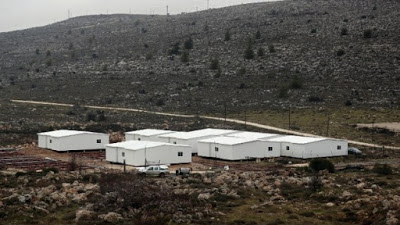 |
| The settlement of Amona |
Settlers
like Education Minister, Naftali Bennett were not homeless. Bennett came as a rich businessman from
Brooklyn, New York. He and thousands of
others are ideological squatters. They
believe they are fulfilling god’s commandments to steal the land of
others. Unlike in Britain they are
backed by the force of the State.
have squatted in their thousands on private Palestinian land [i.e. land which
the State has not confiscated under one pretext or another] to which they have
no entitlement.
 |
| Attorney General Avichai Mandelblit attends a ceremony in Jerusalem, June 13, 2017. (Yonatan Sindel/Flash90) |
Instead of
evicting them, as would happen if Palestinians in Israel did the same, the
Knesset recently passed a ‘Regularisation Law’ which regularised the position
of the land thieves. It retrospectively
legalised the theft of private Palestinian land in the West Bank. Even the Attorney General, Avichai Mendelblit,
a member of Likud, refused to support it describing it as unconstitutional but
Netanyahu and his far-Right government proceeded regardless. After all this is what settler colonialism
has always done.
believe that god gave them the land, on the basis that their ancestors,
completely mythical creatures, apparently lived there a few thousand years ago. Imagine if the whole world were ordered on
this basis! In reality the settlers are
doing no more than colonists have always done in places like Southern
Africa. Using the Bible to justify their
expropriation of the land of the indigenous people.
See also the excellent article by Gideon Levy Oh Merciful God, Show Some [Mercy] to Victims
Greenstein
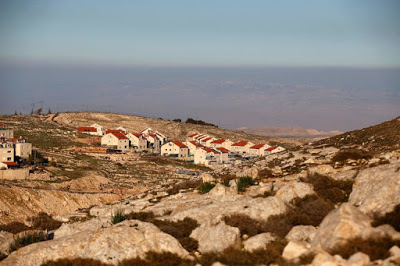 |
|
The Israeli settlement of |
High Court: Law Seizing Palestinian Land Is Humane Response to ‘Distress’ of
Thousands of Settlers
lawyer representing the state says expropriation of Palestinian lands in West
Bank is constitutional under both Israeli and international law
22.08.2017 12:17 Updated: 12:18 PM
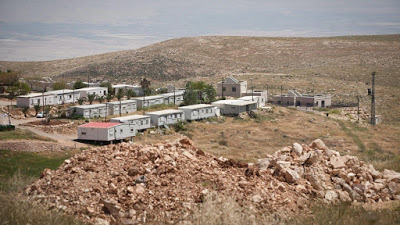 |
| The unauthorized outpost of Mitzpeh Kramim. Israel says the expropriation law would help residents there with construction. Michal Fattal |
The
state on Monday asked the High Court of Justice to reject legal challenges to a
controversial law that would allow for the retroactive expropriation of land
owned by Palestinians in West Bank settlements. It called the law “a humane, proportional and reasonable
response to the genuine distress of Israeli residents.”
In seeking
to persuade the court to reject the legal challenges – filed by Palestinian and
Israeli human rights organizations – the state argued that the “practical
alternative” to the law is the maintenance of the existing situation, which the
state said is disruptive to the lives of “hundreds of families” in settlements,
including families who built homes based on representations by government
authorities that it was permissible.
added that the law is constitutional under Israeli law and also meets the
requirements of international law.
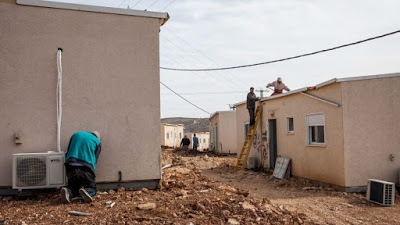 |
| Amona settlers building |
specific provisions, the law allows Jewish settlers to remain in homes built on
privately owned Palestinian land, even though it does not grant them ownership
of the land. It also denies the Palestinian owners the right to claim the land
or take possession of it “until there is
a diplomatic resolution of the status of the territories.”
response was prepared by Harel Arnon, a private lawyer retained by the
government after Attorney General Avichai Mendelblit refused to represent it,
saying the legislation was not constitutional. Prior to its passage, he also
tried to halt the legislative process.
of the law had been informally suspended following the legal challenge.
However, at Mendelblit’s request, the court made the suspension official on
Monday through a court order. This will remain in effect until the court makes
its ruling.
 |
| Bennett shakes hands with Zeev Elkin |
provides a mechanism for compensating Palestinians whose lands are seized: A
landowner can receive an annual usage payment of 125 percent of the land’s
value as determined by an assessment committee, or an alternate plot of land if
this is possible – whichever the Palestinian landowner chooses.
said the law addressed “a reality in
which the owners of the land are not benefiting from their rights, particularly
a reality that time after time has been polarizing and tearing Israeli society
apart, and severely harming public trust and institutions of government.”
called the current situation “a national
problem.”
noted a number of cases in which it said residents would benefit from the law
if it is found constitutional, including construction at the unauthorized
outpost of Mitzpeh Kramim and a number of buildings in the settlement of Ofra.
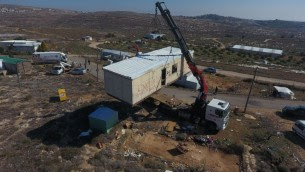 |
| Demolition of Amona |
response included data from the Israeli Civil Administration in the West Bank,
detailing the numbers of orders issued against illegal settlement construction
on privately owned Palestinian land.
between 2012 and 2016, orders were issued against 285 illegally built
structures; between 2007 and 2011, orders were issued in connection with 251
structures; and between 2002 and 2006, more than 450 orders were issued.
Between 1992 and 1996, however, the figure was only 20.
conclusion, the state said that although there are many issues that prompted
the legal challenges to the law requiring thorough consideration, ultimately
the petitioners are making “much ado
about nothing.”
state said, does not run counter to any precedent or legal principle, and
instead is meant to deal with a unique and complex situation that at times has
led to demolitions that benefited no one – a situation that places hundreds of
families under “a cloud of uncertainty.”
the organizations Yesh Din, Peace Now and the Association for Civil Rights in
Israel – which are some of the petitioners in the case – responded: “The State of Israel, in its response today,
is trying to present the land expropriation law as addressing a national
problem, when in practice it involves continued government support for a
criminal enterprise that has continued for decades.
to the rights of the Palestinian landowners, and at the same time is trying to
present the Israeli citizens who are taking part in the looting of West Bank
Palestinians as people who have been harmed and who require ‘compensation’ for
their part in the looting,” they added. “We
hope the court rejects the state’s arguments out of hand, strikes down this
unconstitutional and immoral law, and sends a loud and clear message: No more.”
Correspondent
State
says outpost legalization law protects Palestinians
Responding to petition from left-wing NGOs, government
insists preventing additional outpost evacuations is in Israel’s ‘national
interest’
In its official response Thursday to a High Court of
Justice petition against a new law to legalize wildcat West Bank outposts, the
state argued that the legislation, if implemented, would benefit Palestinians.
Private attorney Harel Arnon crafted the response on behalf
of the state after Attorney General Avichai Mandelblit refused to defend the
legislation. In his 156-page response, Arnon wrote that the law will ensure
just compensation for Palestinian landowners who would otherwise receive the
death penalty from the Palestinian Authority for selling their land to Jews.
“The law even
improves the situation of landowners, who will receive significant compensation
for the use of their land — an option denied to them without the law,” Arnon wrote on behalf of the state.
The response also rejected claims that the legislation
violates Israeli and international law. Arnon argued that it was in Israel’s
“national interest” to prevent the evacuation of the some 4,000 homes that the
law would legalize retroactively.
in the central West Bank on February 6, 2017. (Courtesy Amona Council)
“The Regulation Law
balances the obligation of the government towards thousands of citizens who
have relied in good faith on government action and a minor infringement of
property rights, with increased compensation to the landowners,” the state concluded.
Passed over six months ago, the Regulation Law allows the
Israeli government to expropriate private Palestinian land where illegal
outpost homes have been built ex post facto, provided that the outposts were “built in good faith” or had government
support.
In return, the legislation states, the Palestinian
landowners will be compensated financially or with other land.
The passage of the bill, originally meant to save the
since-razed outpost of Amona, was roundly condemned by a slew of activists and
political figures in Israel and abroad.
Its legality was immediately challenged in a High Court
petition from left-wing NGOs Peace Now, Yesh Din and ACRI (Association for
Civil Rights in Israel) on behalf of 27 Palestinian local councils and 13
Israeli civil society organizations.
Regardless of the petition, the law was supposed to have
gone into effect last week. However, at the behest of Mandelblit, the High
Court ruled Thursday to freeze
its implementation for two months.
hands with Minister for Jerusalem Affiars Zeev Elkin after a vote on the
so-called Regulation Bill, a controversial bill that seeks to legitimize
illegal West Bank outposts, December 7, 2016. (Hadas Parush/Flash90)
Consequently, no additional land will be expropriated even
if it fits the above conditions. At the same time, outposts found to have been
built in good faith or with government backing will not be demolished until a
final decision is made.
Justice Minister Ayelet Shaked echoed state’s response to
the High Court petition in a Monday statement praising the legislation. “The law offers a counter to the racism of
the Palestinian Authority, which places the death penalty on those who sell
land to Jews,” she said
But the left-wing NGOs behind the High Court challenge said
the government’s response was an attempt to cover for a “criminal enterprise.”
“The Israeli
government’s response seeks to present the expropriation law as a solution for
a national problem, while the real problem is the state’s involvement in
illegal settlement activity for the past five decades,” they said in a joint statement.
The court is now set to hear a response from the Knesset’s
legal adviser in mid-September, followed by what is expected to be an
unprecedented challenge to the law from Mandelblit himself in October.
the Regulation Law, Mandelblit warned that the legislation bypassed standard
land regulation procedures in the West Bank and that it legalized Israeli
settlements built on private Palestinian land in breach of local and
international law.
Mandelblit also cautioned that the legislation openly
curtailed property rights of Palestinians in the West Bank in a way that
contravenes the protections granted to occupied populations under the Fourth
Geneva Convention.
When the Knesset passed the law anyway, Mandelblit
officially notified the High Court that he would not defend the legislation if
it was challenged. Arnon was subsequently chosen to represent the state in
Mandeblit’s stead.
In May, Haaretz revealed that Arnon’s own home in the
Elazar settlement is being built illegally on land that had been designated
strictly for military purposes.
illegal structures could be legalized under Israel’s contentious ‘land-grab’
law, whose validity is now being determined by the High Court of Justice
evacuated by Israel. Emil Salman
lands in the West Bank, according to Civil Administration data. These illegal
structures could be legalized under the expropriation law, whose validity is
now being determined by the High Court of Justice in response to Palestinian
petitions against the law.
Palestinian land were revealed in an appendix to the state’s response to the
petitions.
settlements or outposts were built “in good faith or at the state’s
instruction,” and deny its owners the right to use those lands until there is a
diplomatic resolution of the status of the territories. The measure provides a
mechanism for compensating Palestinians whose lands are seized.
three categories. The first includes 1,285 structures that are clearly private
land. These are structures built during the past 20 years on land that was
never defined as state land and all have had demolition orders issued against
them. The second category comprises 1,048 structures that were built on private
land that had earlier been erroneously designated state land. The third
category contains 1,122 structures that were built more than 20 years ago,
during a period when planning laws were barely enforced in the West Bank.
adjacent to the jurisdictions of 74 settlements throughout the West Bank. Of
these, 874 are in outposts – small, illegal satellites of larger settlements.
One example would be the Tzur Shalem outpost near Karmei Tzur in the Etzion
Bloc. Amona, which was evacuated in February, was another example. The other
411 are individual structures that were built on enclaves of private land
within various legal settlements that were planned in accordance with Israeli
law.
just passed the land-grabbing law. What is it all about?
what the Civil Administration calls “regularized private land,” meaning lands
whose owners are known and whose ownership is formally registered. The other
homes are built on lands recognized as private after aerial photos proved that
these lands had been cultivated over the years, but there is no definitive
registry of who was cultivating them. Cultivating land establishes ownership in
the West Bank in accordance with the Ottoman-era laws that still prevail there.
the Interdisciplinary Center, Herzliya, “Regularized
land is land for which there is clear land registration, whether performed
under Jordanian rule or during the Mandate period. The land at Amona was
regularized land. In these cases there is no doubt about the rights because the
registration invalidates any competing right and there’s no such thing as a
statue of limitations on registered land. Non-regularized land can be
unregistered but known to be privately owned, or registered but in a registry that
doesn’t have the same strong evidentiary power.”
erroneously declared state land. Because the original declarations of state
land were based on obsolete surveying technology, when the technology improved,
errors were discovered and lands were removed from the state land listings. As
a result, 1,048 structures suddenly found themselves outside the “blue line”
that demarcates state lands. Of these, 799 structures are in areas that had a
valid master plan and were thus planned and built based on the earlier
declarations. Of this subcategory, 303 buildings are in the ultra-Orthodox city
of Modi’in Ilit.
Civil Administration admitting that in most cases the owners of the lands are
known. These structures, however, were built more than 20 years ago, during a
period when there was almost no oversight regarding construction on private
Palestinian land. Until 1998, the policy was to conduct virtually no
enforcement actions in the settlements. Of these 1,122 structures, 480 are in
Ofra, 193 are in Beit El, and 146 are in Elon Moreh. Dozens of other such homes
were built in Eli, Shavei Shomron, Psagot, Ma’aleh Michmash and Hermesh.
the West Bank, 1,576 (around 45 percent) were built on regularized private land
and the rest on private land whose owners are not confirmed. This number
includes residential structures and public buildings, mobile and permanent
alike, but doesn’t include other types of structures like storage rooms,
fences, roads and infrastructures that were built on private land.
in a recent Peace Now report, which estimated that the expropriation law could
legalize up to 4,000 housing units in the settlements and outposts. Outposts
that could be legalized included Avigail, Ahuzat Shalhevet, Beit El East, Bat
Ayin West, Jebal Artis, Hill 725, Givat Assaf and more. The report noted that
numerous homes could also be legalized in Oranit, Asfar, Beit El, Givat Ze’ev,
Gitit, Har Gilo and others.
orders were issued against illegal structures in the settlements. Between 2012
and 2016 there were 285 orders issued; between 2007 and 2011 – 251; from 2002
to 2006 – 451; between 1997 and 2001 – 278 orders and between 1992 and 1996
only 20 demolition orders were issued.
